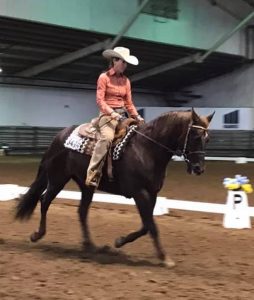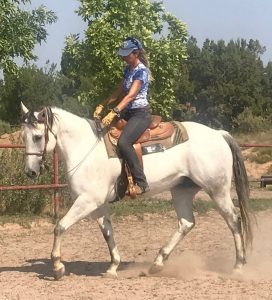Editor’s Note: Best Horse Practices Summit presenter Katrin Silva grew up riding dressage in Germany before moving to the United States at age 19 to learn to ride Western. She’s been riding both disciplines for the last 20 years and is a regular guest columnist for Cayuse Communications. The author of Dressage for All of Us: How to Help Any Horse Become a Happier, More Responsive Riding Partner lives in New Mexico where she works with dressage and Western clients. Visit her blog here.
Katrin writes:
 I’ve always been proud of being a hard worker. For decades, I thought working more was always better than working less. I did not question the wisdom of this statement. Putting in longer hours and riding more horse than other trainers has always been my superpower. I told myself:: “I may not have as much natural talent or outside support as other trainers. I have no control over that. But I can control how much I work, so I will work as much as possible.”
I’ve always been proud of being a hard worker. For decades, I thought working more was always better than working less. I did not question the wisdom of this statement. Putting in longer hours and riding more horse than other trainers has always been my superpower. I told myself:: “I may not have as much natural talent or outside support as other trainers. I have no control over that. But I can control how much I work, so I will work as much as possible.”
There was a time when I rode 10-12 horses a day, sometimes seven days a week. I neglected all other parts of my life – friendships, relationships, a healthy diet, simple pleasures. I did not take enough time to enjoy or notice all the moments of beauty and kindness that add up to a good day:
- the smell of coffee
- the caress of a horse’s whiskers against my hand
- the sound of horses munching their hay
- the sun setting in a blaze of red and purple behind the barn
I worked so much that days blurred together into a long assembly line of riding one horse after the other.
Ten years ago, I burned out. My mind overloaded. My body demanded rest. I ended up walking away from horses completely, but soon recognized that I could not live without them. I need horses like a plant needs sunlight and water, so I started redefining and rebuilding my training business, with a better understanding of what I was trying to accomplish through my work, and why. I resolved to put the horses’ needs first from now on, instead of their owners’ demands, or my own self-imposed mandates.
 Listening to my horses has made me think about finding a more sensible, more sustainable work ethic. Horses thrive on consistency, true. Riding a horse for eight hours on a Saturday and then letting him stand around for two weeks does not build the right muscles over his topline, or a good partnership. Consistent work can mean a flexible, varied kind of consistent, not a rigid, demanding schedule.
Listening to my horses has made me think about finding a more sensible, more sustainable work ethic. Horses thrive on consistency, true. Riding a horse for eight hours on a Saturday and then letting him stand around for two weeks does not build the right muscles over his topline, or a good partnership. Consistent work can mean a flexible, varied kind of consistent, not a rigid, demanding schedule.
I’ve learned, too, that it’s essential to end every ride on a high note.There comes a point of diminishing returns in a training session, when I know I will undo progress if I keep going. In other words, if I want my horses to learn, I always want to quit before the horse quits on me. So, sessions might end sooner than I planned.
When I’m working with a horse, I try to find the magic zone between too much and not enough, the zone where physical and mental fitness builds, the zone where their minds and bodies are actively engaged, but not stressed to their limits.
When a horse starts every ride with curious, happy energy, I know I’ve found this sweet spot. I’m overdoing it when horses become cranky or dull, when their backs get sore, when their tails start swishing.
It’s hard to apply the wisdom our horses teach us, in this case about balance, to our own lives. I still work a lot. All good horse trainers work a lot. There seems to be no way around that. And the notion of wet saddle pads from consistent work remains a great standard. But our horses also teach us that more is not always better:
— Mindless drilling of the same movement leads nowhere.
— Monotony is poison to a happy spirit.
— Easy days need to follow hard days.
— Pushing through fatigue leads to injury and stagnation
I love my work, which makes it easy to lose sight of my own magic zone. Though I still put in long hours, I am trying to do it in a sustainable way, with regular days off and a less rigid schedule. The concept of self-care sounds like self-indulgence, to me. But I know it’s not. My new goal is to treat myself more like I treat the horses. More is not always better. It’s an ambitious goal for this workaholic, but I have to get there if I want to still love my work 10 years from now.